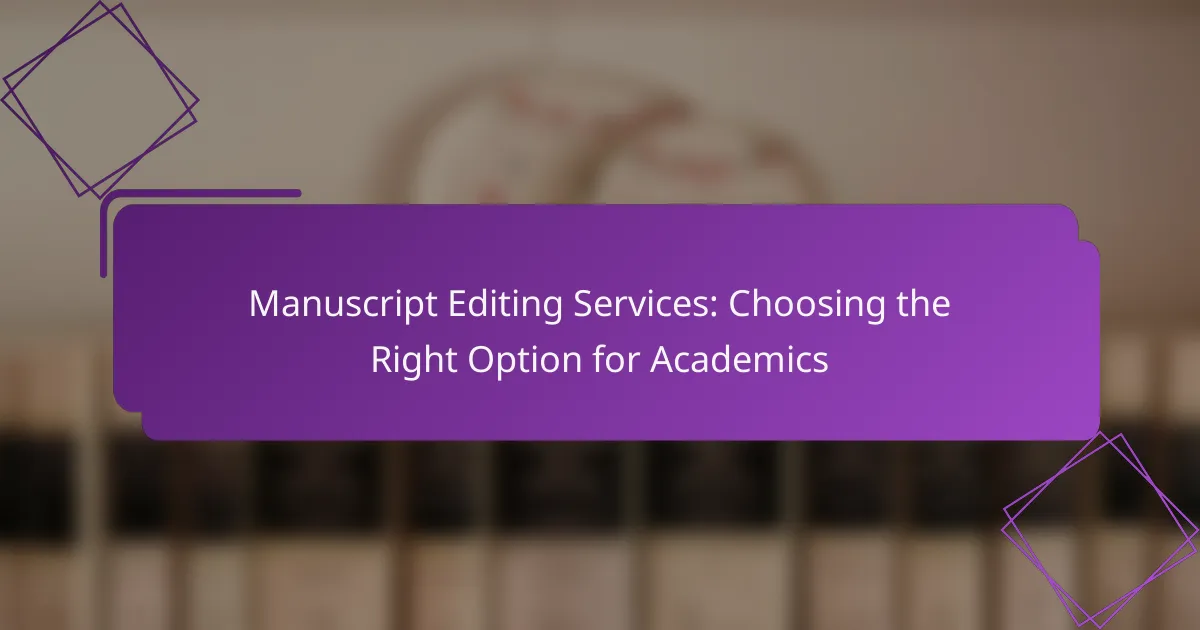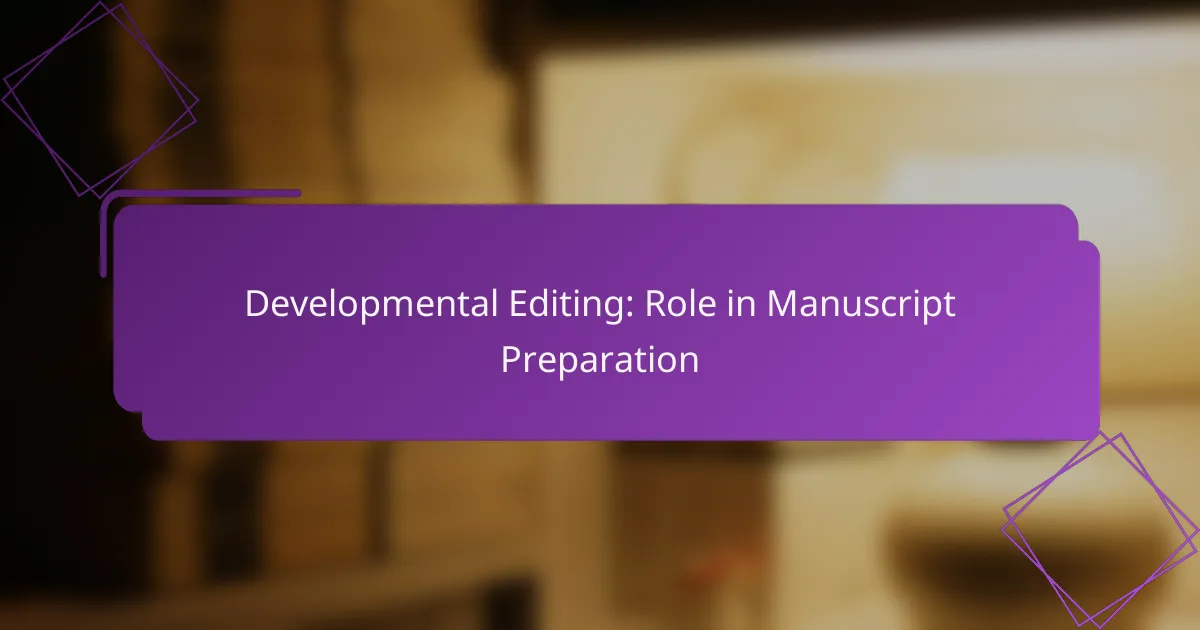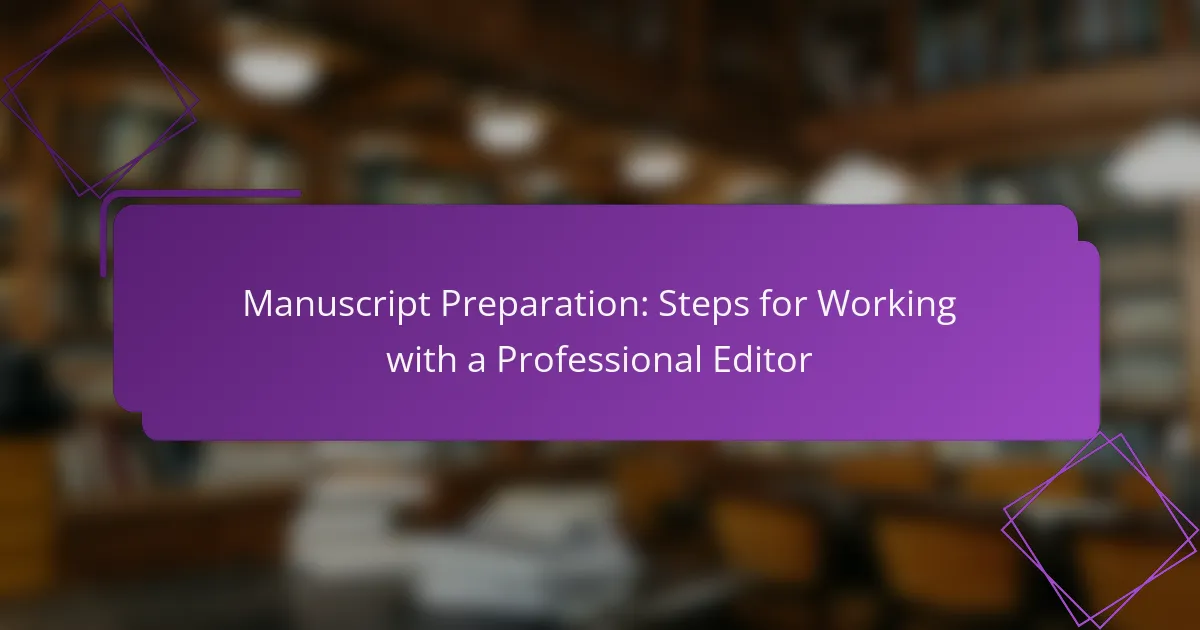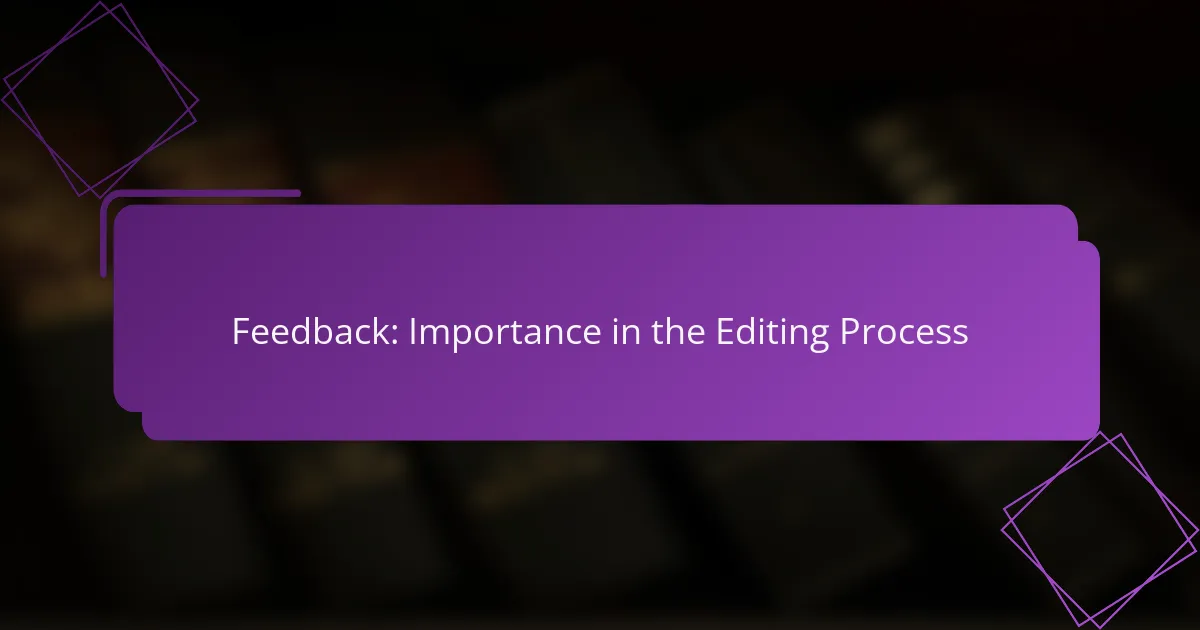Manuscript editing services play a crucial role in helping academics refine their scholarly writing by enhancing clarity, coherence, and overall quality. When selecting the right service, it’s essential to evaluate your specific needs, the expertise of the editors, and the types of editing offered to ensure alignment with your academic goals.
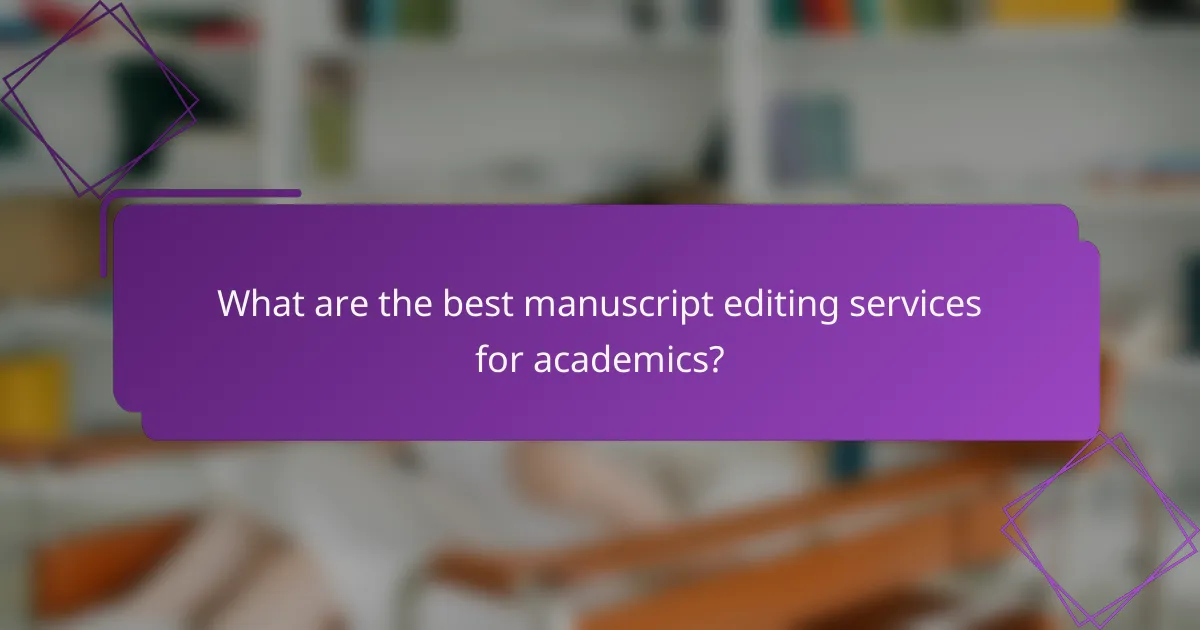
What are the best manuscript editing services for academics?
The best manuscript editing services for academics provide specialized support to enhance the clarity, coherence, and overall quality of scholarly writing. These services typically include language editing, formatting, and compliance checks tailored to academic standards.
Editage
Editage is a well-regarded service that offers comprehensive editing for academic manuscripts. They provide subject-specific editors who are familiar with various fields, ensuring that your work meets the expectations of your target journal.
Consider their range of services, which includes language editing, formatting, and even journal submission support. Their turnaround times vary, but many projects can be completed within a week, depending on the length and complexity of the manuscript.
Enago
Enago specializes in editing services for researchers and academics, focusing on improving the language and structure of manuscripts. They employ editors with advanced degrees in various disciplines, which enhances the quality of feedback and revisions.
They offer a tiered pricing model based on the level of editing required, from basic language checks to comprehensive editing. Enago also provides a satisfaction guarantee, which can be reassuring for first-time users.
Wordvice
Wordvice is known for its user-friendly platform and quick turnaround times. They offer a variety of editing services, including academic editing, proofreading, and even application editing for grants and fellowships.
With competitive pricing and a straightforward ordering process, Wordvice is a solid choice for academics looking for efficient service. Their editors are experienced in various fields, ensuring that your manuscript is polished and ready for submission.
ProofreadingPal
ProofreadingPal offers a dual-editor model, where two editors review your manuscript to ensure thoroughness and accuracy. This service is particularly beneficial for complex academic papers that require meticulous attention to detail.
Their pricing is based on word count and turnaround time, with options for expedited service. This makes it a flexible choice for academics who may have tight deadlines.
Cambridge Proofreading
Cambridge Proofreading is recognized for its high-quality editing services tailored specifically for academic writing. Their editors are often experienced researchers, which helps them understand the nuances of scholarly communication.
They provide a detailed feedback report along with the edited manuscript, which can be invaluable for authors looking to improve their writing skills. Pricing is competitive, and they offer a range of turnaround options to accommodate different needs.
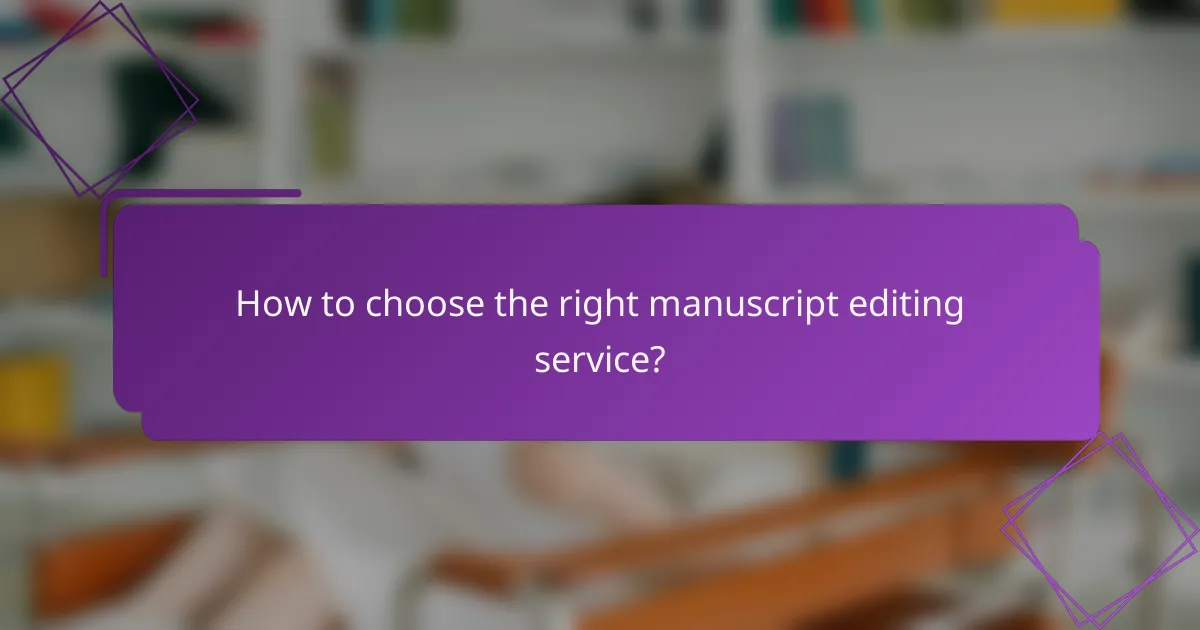
How to choose the right manuscript editing service?
Choosing the right manuscript editing service involves assessing the specific needs of your work, understanding the available services, and evaluating the qualifications of the editors. Consider factors such as the type of editing required, the expertise of the editors, and the pricing to ensure you select a service that aligns with your academic goals.
Evaluate service offerings
When evaluating manuscript editing services, consider the types of editing they provide, such as developmental editing, copyediting, or proofreading. Each type serves different purposes; for instance, developmental editing focuses on structure and content, while copyediting addresses grammar and style.
Look for services that cater specifically to your field of study, as familiarity with discipline-specific terminology can significantly enhance the quality of the editing. Some services may also offer additional features like formatting for specific journals or assistance with submission guidelines.
Check editor qualifications
It’s crucial to verify the qualifications of the editors who will be working on your manuscript. Look for editors with advanced degrees in your field or substantial experience in academic publishing. Many reputable services provide profiles of their editors, detailing their expertise and past work.
Additionally, consider whether the editors are familiar with the specific requirements of your target journals. This knowledge can be invaluable in ensuring your manuscript meets all necessary standards for submission.
Compare pricing structures
Pricing for manuscript editing services can vary widely based on the level of editing required, the complexity of your manuscript, and the turnaround time. Generally, you may find prices ranging from around $0.01 to $0.05 per word, depending on the service level.
Be wary of extremely low prices, as they may indicate a lack of quality or experience. Look for transparent pricing structures that clearly outline what is included in the service, such as revisions or formatting, to avoid unexpected costs later on.
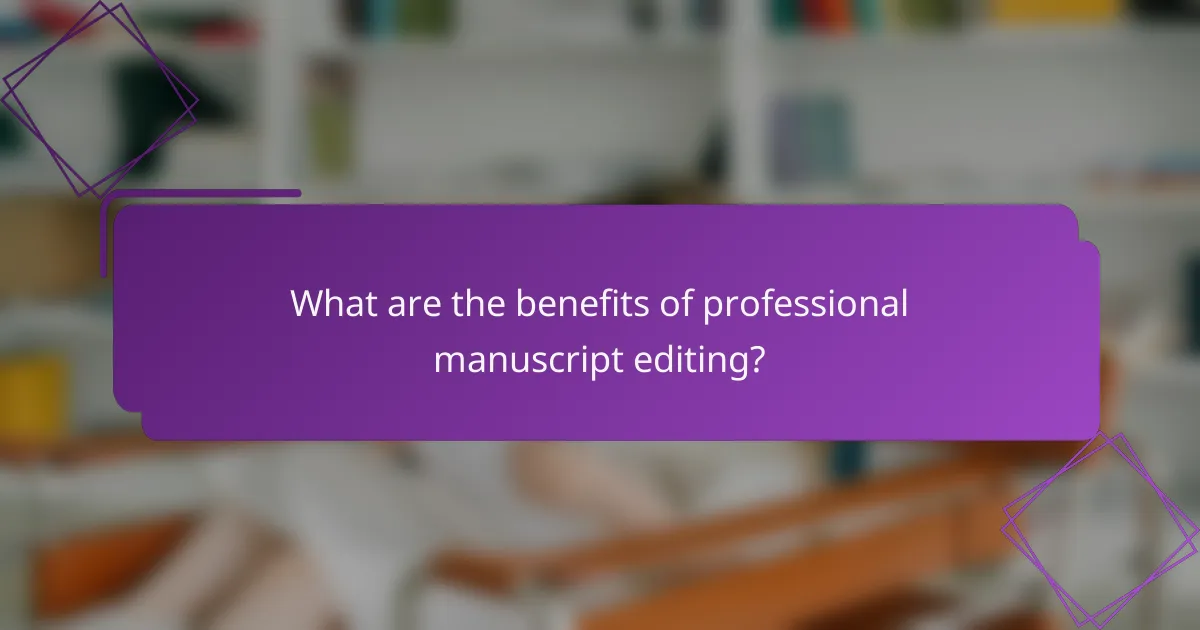
What are the benefits of professional manuscript editing?
Professional manuscript editing offers several advantages, including enhanced readability, improved chances of publication, and valuable expert insights. These services help academics refine their work, making it more appealing to journals and readers alike.
Improved clarity and coherence
Professional editing focuses on enhancing the clarity and coherence of your manuscript. Editors help streamline complex ideas, ensuring that your arguments are logically structured and easy to follow. This can involve rephrasing sentences, reorganizing sections, or clarifying terminology.
To achieve clarity, consider using straightforward language and avoiding jargon unless necessary. A good editor will ensure that your message is conveyed effectively, making your work accessible to a broader audience.
Increased publication chances
Manuscripts that undergo professional editing often have a higher likelihood of being accepted for publication. Editors can identify common pitfalls that lead to rejection, such as unclear arguments or formatting issues. By addressing these concerns, you enhance your manuscript’s overall quality.
Research indicates that well-edited papers are more likely to meet the standards of academic journals. Investing in editing services can significantly reduce the time and effort spent on revisions after submission.
Expert feedback on content
Professional editors provide valuable feedback on the content of your manuscript, offering insights that can strengthen your arguments and improve overall quality. They may suggest additional sources, highlight gaps in your research, or recommend ways to enhance your conclusions.
When selecting an editing service, look for editors with expertise in your field. Their specialized knowledge can help ensure that your manuscript meets disciplinary standards and resonates with your target audience.

What should you expect from a manuscript editing service?
A manuscript editing service should provide thorough revisions to improve the clarity, coherence, and overall quality of your academic writing. Expect detailed feedback, timely delivery, and a range of editing options tailored to your specific needs.
Detailed editing report
A detailed editing report is a crucial component of manuscript editing services. This report typically outlines the changes made, highlights areas for improvement, and provides suggestions for enhancing your writing style and structure.
When selecting a service, look for those that offer comprehensive feedback, including comments on grammar, punctuation, and adherence to academic standards. A well-structured report can guide your future writing endeavors.
Turnaround time
Turnaround time varies significantly among manuscript editing services, often ranging from a few days to several weeks. Consider your submission deadlines when choosing a service, as timely editing is essential for meeting academic requirements.
Many services offer expedited options for an additional fee, which can be beneficial if you are facing tight deadlines. Always confirm the expected delivery date before committing to ensure it aligns with your schedule.
Types of editing offered
Developmental editing focuses on the overall structure and content, while copyediting addresses grammar, style, and formatting. Proofreading is the final step, catching any remaining errors. Choose a service that offers the type of editing that best suits your manuscript’s needs.

What are common manuscript editing mistakes to avoid?
Common manuscript editing mistakes include neglecting formatting guidelines and overlooking language nuances. These errors can significantly impact the clarity and professionalism of academic work, potentially hindering publication opportunities.
Ignoring formatting guidelines
Adhering to specific formatting guidelines is crucial for academic manuscripts. Different journals and institutions have unique requirements regarding citation styles, font sizes, margins, and overall layout. Ignoring these can lead to immediate rejection or require extensive revisions.
To avoid this mistake, always review the submission guidelines of your target journal. Create a checklist to ensure that your manuscript meets all formatting criteria before submission. For instance, if a journal requires APA style, ensure all references are correctly formatted and that in-text citations are consistent.
Overlooking language nuances
Language nuances, including idiomatic expressions and technical terminology, can vary significantly across disciplines and regions. Failing to recognize these subtleties can result in miscommunication or misinterpretation of your research findings.
To mitigate this risk, consider the audience for your manuscript. Use clear and precise language that aligns with the expectations of your field. For example, if writing for an international audience, avoid colloquialisms that may not translate well. Additionally, utilizing professional editing services can help identify and correct language issues specific to your discipline.
